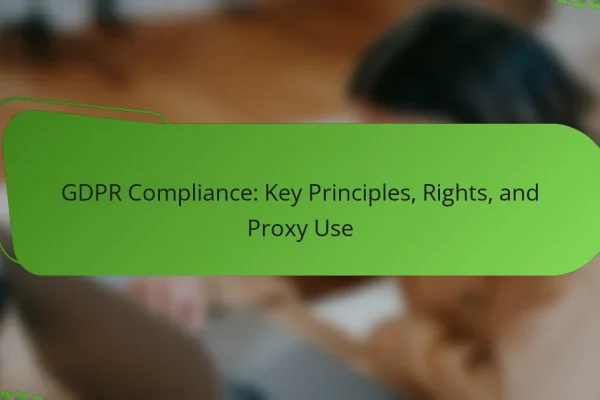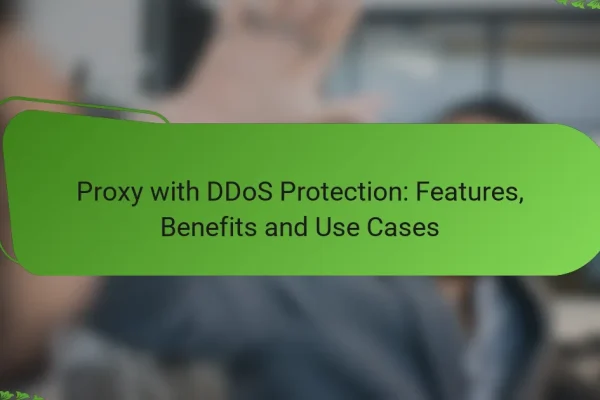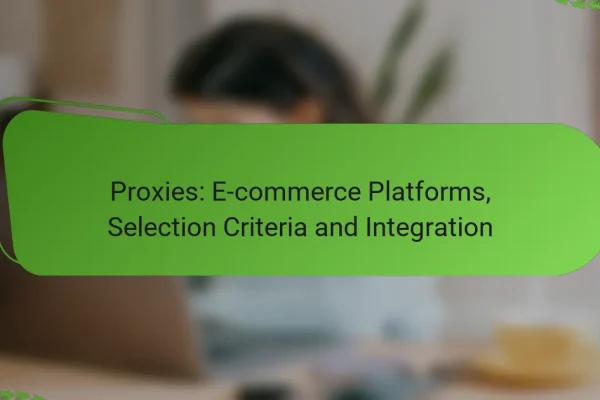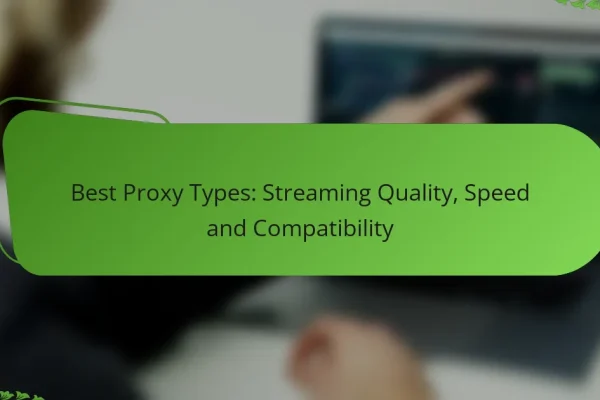
Proxies for Remote Work: Security Features, Benefits and Best Options
Proxies play a crucial role in enhancing security for remote work by acting as intermediaries…
Proxy services play a crucial role in maximizing online privacy by acting as intermediaries that mask users' identities and activities. By employing techniques such as IP address masking and data encryption, these services help users navigate the internet securely while bypassing geo-restrictions. Choosing the right proxy service involves considering factors like speed, privacy policies, and customer support to ensure it meets your specific needs.

Proxies play a crucial role in enhancing security for remote work by acting as intermediaries that protect sensitive data and maintain user privacy. With features like IP masking and data encryption, they not only safeguard information but also enable access to restricted online resources. Utilizing the best proxy services can significantly improve productivity and security…

The General Data Protection Regulation (GDPR) establishes essential principles for protecting personal data and upholding individuals’ rights. Compliance is crucial for organizations, particularly Software as a Service (SaaS) providers, as it fosters user trust and mitigates the risk of penalties. Individuals are empowered under GDPR with rights such as data access, correction, and deletion, allowing…

A proxy with DDoS protection is crucial for safeguarding online services against distributed denial-of-service attacks, ensuring enhanced security and uninterrupted access to web resources. By filtering malicious traffic, these solutions not only maintain website uptime but also improve overall user experience and reduce infrastructure costs for businesses. What are the key features of proxy with…

IP masking is a crucial practice for enhancing online privacy and security, allowing users to navigate the internet with greater anonymity. By concealing their real IP addresses, individuals can access restricted content and protect their personal information from potential threats. Various methods, including VPNs, proxy servers, and the Tor network, are commonly employed to achieve…

Proxies serve as vital automation tools that significantly improve web scraping, data collection, and online privacy by efficiently managing IP addresses. By implementing features such as rotating proxies and geo-targeting, these tools streamline automated tasks and enhance data accuracy. Adopting best practices, like regularly monitoring performance and rotating IPs, further optimizes the efficiency and security…

In the competitive landscape of e-commerce, leveraging proxies can significantly enhance performance and security. Choosing the right proxy service involves evaluating key factors such as speed, geolocation, and IP rotation, which are essential for effective data management and transaction efficiency. Additionally, various integration methods, including API integration and browser extensions, provide flexibility for businesses to…

When it comes to streaming quality, speed, and compatibility, choosing the right proxy type is crucial. Residential, data center, and mobile proxies each offer unique benefits that can enhance your streaming experience while navigating geo-restrictions. Understanding these differences will help you select the most effective proxy for your needs. What are the best proxy types…

When considering proxy services, it’s crucial to be aware of potential hidden fees that can dramatically inflate your overall costs. Charges such as setup fees, data overage costs, and IP rotation fees may not be immediately apparent, impacting both your budget and service experience. Understanding these hidden costs can help you choose a provider with…

When choosing between free and paid proxies, users must weigh the immediate appeal of no monetary cost against potential drawbacks such as security risks and limited performance. While free proxies may seem attractive for casual use, paid options provide enhanced speed, stability, and security, typically ranging from £5 to £50 per month. Understanding these differences…

Selecting a budget proxy service requires careful consideration of performance, customer support, and pricing. Services like Smartproxy, Bright Data, and Oxylabs offer varying features to suit different needs, making it essential to evaluate what each option provides. Key features such as IP rotation and location diversity are crucial for maintaining anonymity and accessing geo-restricted content…
Proxy services enhance online privacy in the UK by acting as intermediaries between users and the internet, helping to conceal users' identities and activities. They achieve this through various methods, including IP address masking, data encryption, and bypassing geo-restrictions.
IP address masking is a fundamental feature of proxy services that hides your real IP address from websites and online services. When you connect through a proxy, your requests appear to come from the proxy server's IP address, not your own, making it difficult for third parties to track your online behavior.
This method is particularly useful for maintaining anonymity while browsing or accessing sensitive information. However, users should choose reputable proxy providers to ensure their data remains secure and private.
Data encryption is another critical aspect of proxy services that protects your online communications from eavesdropping. When data is encrypted, it is transformed into a secure format that can only be read by authorized parties, safeguarding sensitive information from hackers and other malicious entities.
Many proxy services offer SSL encryption, which is standard for secure web traffic. Users should look for proxies that provide strong encryption protocols to ensure their data remains confidential, especially when using public Wi-Fi networks.
Geo-restriction bypassing allows users to access content that may be restricted in their region. By connecting to a proxy server located in a different country, users can appear to be browsing from that location, enabling access to websites and services that may be blocked in the UK.
This feature is particularly beneficial for streaming services that have different content libraries based on geographic location. However, users should be aware that some services actively block proxy connections, so choosing a reliable proxy that can effectively bypass these restrictions is essential.
The best proxy services for privacy in the UK include NordVPN, ExpressVPN, and Surfshark. These services are known for their strong encryption, no-logs policies, and user-friendly interfaces, making them ideal for enhancing online privacy.
NordVPN is a popular choice for users seeking privacy, offering advanced security features such as double VPN and Onion over VPN. It has a vast network of servers, allowing users to connect from various locations while maintaining anonymity.
When using NordVPN, consider its user-friendly apps available for multiple platforms. The service provides a 30-day money-back guarantee, allowing users to test its features risk-free.
ExpressVPN is renowned for its speed and reliability, making it suitable for streaming and browsing securely. It employs strong encryption protocols and has a strict no-logs policy, ensuring user data remains private.
This service offers a wide range of server locations, which can help bypass regional restrictions. Users can also benefit from a 30-day trial period to evaluate its performance before committing.
Surfshark stands out for its affordability and unlimited device connections, making it a great option for families or multiple devices. It features strong security measures, including CleanWeb to block ads and malware.
With a 30-day money-back guarantee, Surfshark allows users to explore its features without financial risk. Its user-friendly interface and fast connection speeds enhance the overall experience for privacy-conscious individuals.
Selecting the right proxy service involves evaluating key factors such as speed, privacy policies, and customer support. Prioritize your specific needs, whether it's for browsing, streaming, or secure data transfer, to find a service that aligns with your requirements.
Speed and performance are crucial when choosing a proxy service, especially for activities like streaming or gaming. Look for services that offer low latency and high bandwidth to ensure smooth operation. A good proxy should provide speeds that are comparable to your regular internet connection.
Consider testing the proxy's performance through free trials or speed tests. Aim for a service that maintains speeds above 10 Mbps for optimal performance in most scenarios.
Understanding the privacy policies of a proxy service is essential for ensuring your online activities remain confidential. Check if the service has a no-logs policy, meaning it does not store any information about your browsing history or personal data.
Be wary of services that are based in countries with strict data retention laws, as they may be required to share user data with authorities. Always read the terms of service to understand how your data will be handled.
Reliable customer support is vital for resolving issues quickly when using a proxy service. Look for providers that offer 24/7 support through multiple channels, such as live chat, email, or phone. This ensures you can get help whenever you need it.
Check user reviews to gauge the responsiveness and effectiveness of the support team. A service with strong customer support can save you time and frustration in the long run.
Proxy services typically offer various pricing models to accommodate different user needs and budgets. The most common models include monthly subscriptions, annual plans, and free trials, each with distinct advantages and considerations.
Monthly subscriptions are a flexible option for users who require short-term access to proxy services. These plans usually range from around $5 to $30 per month, depending on the provider and features included. They are ideal for those who may only need a proxy for a specific project or a limited timeframe.
When choosing a monthly subscription, consider the bandwidth limits, server locations, and customer support offered. Some providers may offer discounts for longer commitments, so it’s worth comparing options before committing.
Annual plans often provide significant savings compared to monthly subscriptions, typically reducing the overall cost by 20-50%. These plans are suitable for users who need ongoing access to proxy services for an extended period. Prices can range from $50 to $300 per year, depending on the service level and features.
Before opting for an annual plan, evaluate the provider's reputation and service quality. Ensure that the plan includes necessary features such as multiple IP addresses, high-speed connections, and reliable customer support.
Free trials allow users to test proxy services without financial commitment, usually lasting from a few days to a week. This is an excellent way to assess the service's performance, features, and compatibility with your needs. Many providers offer free trials, but be mindful of any limitations on bandwidth or server access during this period.
To make the most of a free trial, set clear objectives for what you want to test, such as speed, ease of use, and support responsiveness. Keep track of your experience to inform your decision when selecting a paid plan afterward.
Proxy services and VPNs both enhance online privacy, but they operate differently. While proxies route your internet traffic through a different server, VPNs encrypt your entire connection, providing a higher level of security.
Proxy services primarily act as intermediaries for web requests, masking your IP address and allowing access to geo-restricted content. However, they do not encrypt your data, which means your online activities can still be monitored by third parties.
In contrast, VPNs create a secure tunnel for all your internet traffic, encrypting data to protect it from eavesdropping. This encryption makes VPNs more suitable for sensitive activities, such as online banking or accessing confidential information.
Proxy services are often used for simple tasks like bypassing content restrictions on streaming platforms or accessing websites from different regions. They are generally faster for these purposes since they do not require the overhead of encryption.
VPNs are ideal for users who prioritize security and privacy, such as journalists, activists, or anyone accessing sensitive information. They are also beneficial for users in regions with strict internet censorship, as the encryption helps to maintain anonymity and prevent surveillance.
Using proxy services can expose users to various risks, including data interception, unreliable connections, and potential legal issues. While proxies can enhance privacy, they may also compromise security if not chosen carefully.
One of the primary risks of using proxy services is data interception. Unsecured proxies can allow third parties to monitor and capture sensitive information, such as login credentials and personal data. It is crucial to select a proxy service that employs strong encryption protocols to mitigate this risk.
Free or low-cost proxies often lack adequate security measures, making them more susceptible to data breaches. Users should be cautious and consider premium services that prioritize user privacy and data protection.
Proxy services can sometimes lead to unreliable connections, resulting in slow browsing speeds and frequent disconnections. This can hinder the user experience, especially when streaming content or engaging in online gaming. Users should test the performance of a proxy service before committing to it.
Choosing a reputable provider with a robust infrastructure can help ensure a stable connection. Look for services that offer multiple server locations and have a good track record of uptime.
Using proxy services can lead to potential legal issues, particularly if the service is used to access restricted content or engage in illegal activities. Different countries have varying regulations regarding online privacy and the use of proxies, so users must be aware of local laws.
To avoid legal complications, users should familiarize themselves with the regulations in their jurisdiction and ensure that their proxy usage complies with applicable laws. It's advisable to use proxies for legitimate purposes only, such as enhancing privacy or bypassing geographic restrictions on content.